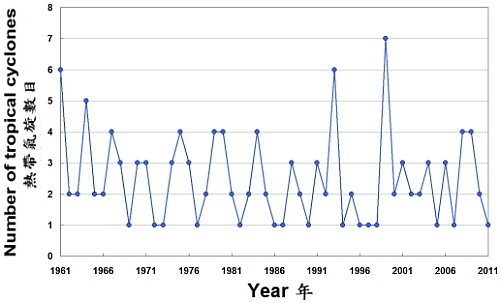Under the influence of global warming, are tropical cyclone activities changing?
Under the influence of global warming, are tropical cyclone activities changing?
TONG Hang-wai
September 2012
Through a question and answer approach, the Climate Change FAQ will explain some basic knowledge and facts of climate change in layman terms in order to enhance the public's understanding of the causes of climate change, its impacts and what we can do to mitigate its effects.
Q: Under the influence of global warming, are tropical cyclone activities changing?
A: Tropical cyclone is one of the most destructive weather systems on Earth. The possible change in tropical cyclone activity in a changing climate is a matter of great concern to the public and decision makers.
According to a study conducted by an expert team of the World Meteorological Organization, it remains uncertain whether the changes in tropical cyclone activities based on the records of different basins in the last century or so, have exceeded the natural variability. This is because the trend detection is complicated by the large fluctuations in the frequency and intensity of tropical cyclones and the limitations in the availability and quality of global historical records. Looking into the future, theory and climate model simulations suggested that, if 21st century warming occurs as projected, the global frequency of tropical cyclones is expected to either decrease or remain unchanged. There will be some increase in the mean maximum wind speed of the tropical cyclones, although increases may not occur in all regions. The rainfall rates associated with tropical cyclones are likely to increase too.
In western North Pacific and the South China Sea (0-45oN, 100-180oE), analysis of the observational data shows that the annual number of tropical cyclones decreases from about 35 in the 1960s to about 27 after 2000. Locally, the annual number of tropical cyclones landing within 300 km of Hong Kong has decreased from about 3 in the 1960s to about 2.5 in the 2000s, but the trend is not statistically significant.

Figure 1: Annual number of tropical cyclones landing within 300 km of Hong Kong (1961-2011)